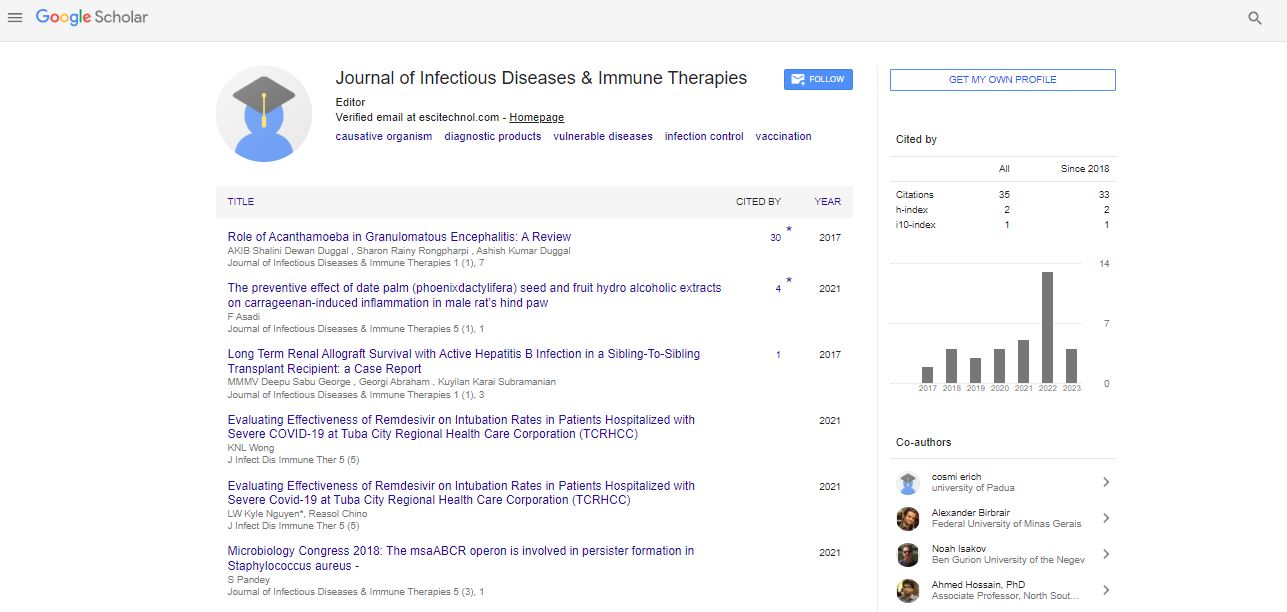Commentary, J Aging Geriatr Med Vol: 7 Issue: 3
Gulf War Syndrome Investigation: Current Findings and Future Directions
Georgie Tillman*
1Department of Neurology, University of Texas Southwestern Medical Centre, Dallas, United States of America
*Corresponding Author: Georgie Tillman,
Department of Neurology, University of
Texas Southwestern Medical Centre, Dallas, United States of America
E-mail: gtillman@utdallas.edu
Received date: 28 August, 2023, Manuscript No. JIDITH-23-117456;
Editor assigned date: 30 August, 2023, PreQC No. JIDITH-23-117456 (PQ);
Reviewed date: 13 September, 2023, QC No. JIDITH-23-117456;
Revised date: 21 September, 2023, Manuscript No. JIDITH-23-117456 (R);
Published date: 29 September, 2023, DOI: 10.4172/2329-9541.1000350
Citation: Tillman G (2023) Gulf War Syndrome Investigation: Current Findings and Future Directions. J Infect Dis Immune Ther 7:3.
Description
The Gulf War Syndrome (GWS), a complex medical condition that affects veterans of the 1990-1991 gulf war, has been the subject of extensive study and debate for decades. This condition presents a range of symptoms, including fatigue, muscle pain, cognitive difficulties, and gastrointestinal issues, which have significantly impacted the lives of those who served in the conflict. Despite ongoing investigations, the exact causes and mechanisms of Gulf War Syndrome (GWS) remain elusive. This article explores the current findings in GWS investigation and outlines potential future directions for uncovering the truth behind this elusive condition.
Current findings
One of the leading hypotheses in Gulf War Syndrome (GWS) investigation revolves around environmental exposures during the war. It is widely accepted that gulf war veterans were exposed to a variety of potential toxic agents, including nerve agents, pesticides, and depleted uranium. Several studies have linked these exposures to the symptoms experienced by veterans. While there is no consensus on a single causative agent, it is clear that environmental factors played a role in the development of Gulf War Syndrome (GWS). Nerve agents, such as sarin and cyclosarin, were used by Iraqi forces during the gulf war, and it is suggested that exposure to these agents may be linked to some of the symptoms experienced by veterans. The use of pesticides, such as organophosphates, during the gulf war is another area of concern. Veterans who were involved in pest control operations were exposed to these chemicals, which have been associated with neurological and gastrointestinal symptoms. Psychological stressors during wartime are known to have a significant impact on veterans' health. The psychological trauma of war may contribute to the development of Gulf War Syndrome (GWS) symptoms, including Post-Traumatic Stress Disorder (PTSD). The interplay between physical and psychological factors in gulf war veterans is a key aspect of ongoing study.
Future directions
Identifying specific biomarkers associated with Gulf War Syndrome (GWS) is a promising avenue for future studies. Biomarkers could help diagnose the condition, track its progression, and potentially reveal underlying mechanisms. Conducting long-term follow-up studies on gulf war veterans to track the evolution of their symptoms and health status is essential. These studies can provide valuable insights into the chronic nature of the condition and its long-term impacts. Enhancing surveillance systems to monitor the health of gulf war veterans is critical. This can help identify emerging patterns of illness and provide early intervention to those affected. Collaborative efforts between experts in various fields, such as toxicology, neurology, immunology, and psychiatry, are necessary for a comprehensive understanding of Gulf War Syndrome (GWS). Multidisciplinary approaches can shed light on the interplay between various factors and mechanisms involved in the syndrome. Developing effective treatments for Gulf War Syndrome (GWS) remains a top priority. Investigating potential therapies, such as cognitive-behavioral therapy, rehabilitation programs, and pharmacological interventions, is crucial to improving the quality of life for affected veterans.
Conclusion
The investigation into Gulf War Syndrome (GWS) has made significant strides over the years, yet many questions remain unanswered. Current study suggests that a combination of environmental exposures, psychological factors, and genetic predisposition may contribute to the development of this complex condition. As investigators continue to explore the intricacies of Gulf War Syndrome (GWS), it is essential to maintain a multidisciplinary approach, encourage collaboration, and provide the necessary resources to further our understanding of this enigmatic illness. Ultimately, our goal is to improve the lives of gulf war veterans who have suffered for far too long and to prevent similar issues in future conflicts.
 Spanish
Spanish  Chinese
Chinese  Russian
Russian  German
German  French
French  Japanese
Japanese  Portuguese
Portuguese  Hindi
Hindi 